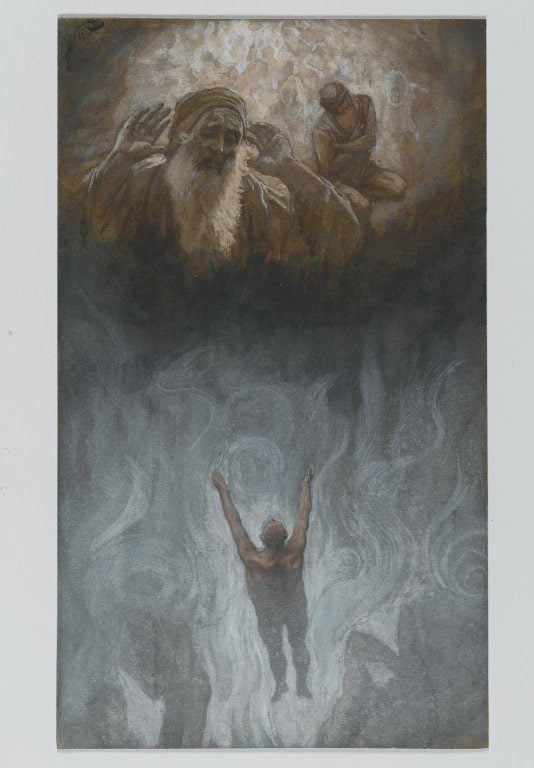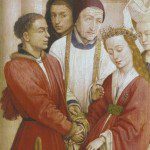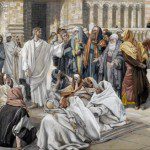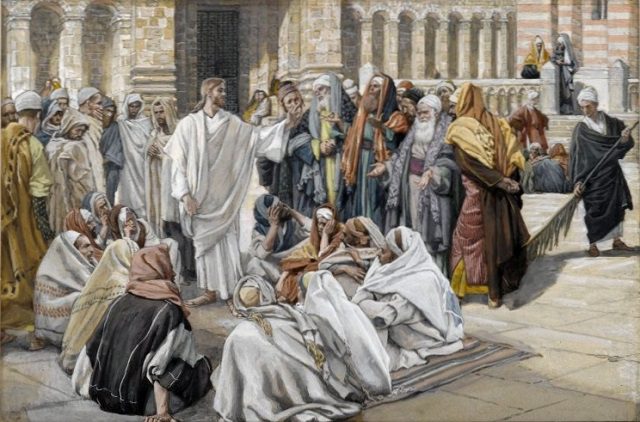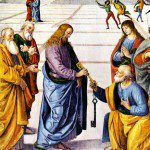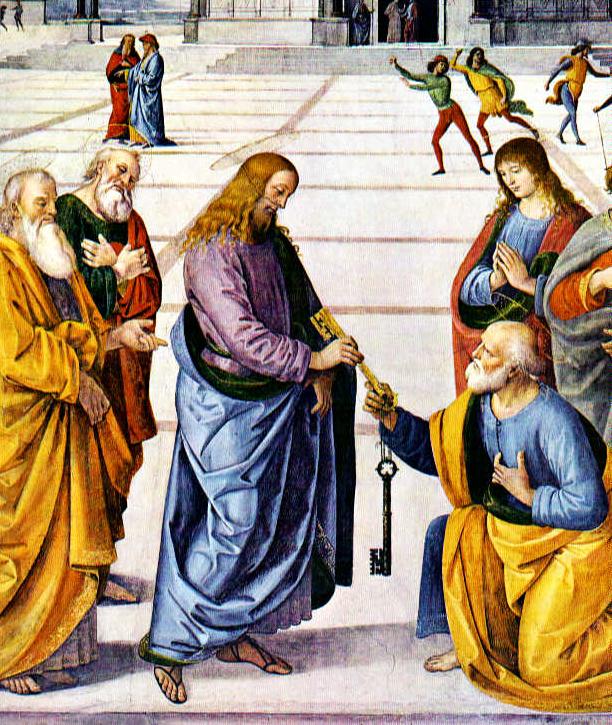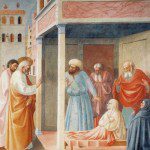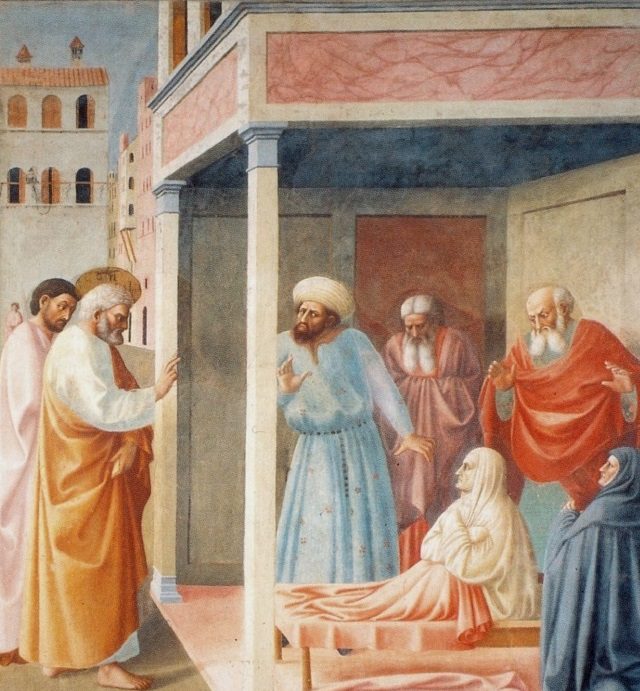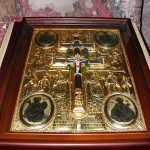(vs. Ken Temple)
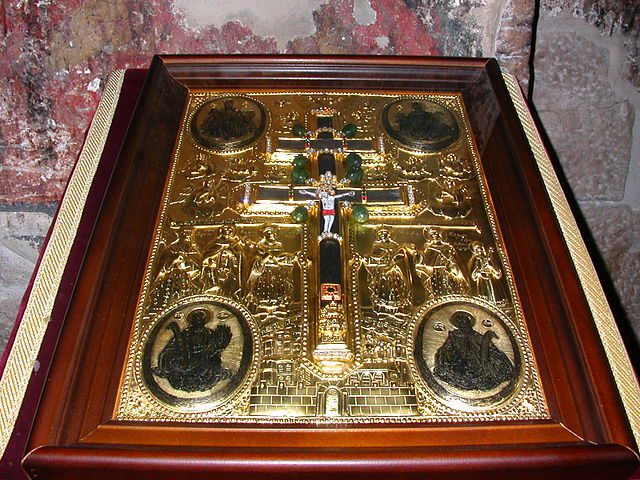
Relic of the True Cross, Decani Monastery, Serbia [Wikimedia Commons / Creative Commons Attribution-Share Alike 3.0 Unported license]
*****
(6-3-08)
Ken’s words will be in blue.
* * * * *
Paul Hoffer noted:
The Martyrdom of Saint Polycarp, written in 155-157 AD clearly shows that the Church practiced the veneration of relics very early in Church history:
Accordingly, we afterwards took up his [St. Polycarp’s] bones, as being more precious than the most exquisite jewels, and more purified than gold, and deposited them in a fitting place, whither, being gathered together, as opportunity is allowed us, with joy and rejoicing, the Lord shall grant us to celebrate the anniversary of his martyrdom, both in memory of those who have already finished their course, and for the exercising and preparation of those yet to walk in their steps. (Chapter 18 )
Yes, the quote from the Martyrdom of Polycarp shows the ancient of practice of honoring his bones; and they rejoiced and celebrated.
But, nowhere does it say that they kissed them or bowed down to them or put money on his grave, etc. or prayed to his “spirit” or his “person” or his “soul” (in heaven) that is the metaphysical reality behind the physical bones left here on this earth.
Even if it did say that they kissed them or bowed to them or prayed to Polycarp, they would be wrong, based on Scripture. But because it does not have those practices with the ancient text of 155-156 AD; then the wrong aspects of the way RCC handles relics is not “deeper in history”.
So, just remembering a great saint and martyr — nothing wrong with that. That aspect is good; and archeology and history and recording the lives and martyrdoms of great Christians is a great thing.
Graves stones are fine, to visit and remember the dead. But there should be none of the other later practices of praying to the dead and kissing relics and touching them and believing one will get a blessing or power or healing etc from the physical substance; as if power would come out from them, etc. These things are all clearly wrong.
Really? How interesting, then, that Elijah’s mantle parted the Jordan River (2 Kings 2:11-14). Elisha’s bones raised a man from the dead (2 Kings 13:20-21). How odd that Paul’s “handkerchiefs or aprons” were used to heal the sick and cast out demons (Acts 19:11-12).
Once again you (ultimately) have profound problems with God’s inspired revelation, not with Catholicism. We follow the Scripture on this. You do not, and instead substitute the dead traditions of men (no pun intended).
Isn’t it too much work and effort to be at odds with the Bible?
Yes, those things happened in Scripture and in Scriptural history; we all agree that they are true and they are in the historical narrative. We know the historical narrative in Kings and Acts is true, because it is inspired, God-breathed Scripture. But there are no teaching sections in Acts, etc. nor in the Epistles that tell us to copy these practices.
The RCC as also Pentecostals and Charismatics and the word of faith movement, need to know the difference between historical narrative Scripture and the teaching/didactive portions of Scripture. Both camps make the same mistakes and interpret and apply the Scriptures wrongly.
But there is no command or principle to try and copy those things; God does miracles when He wants to; not when we think we can manipulate Him into doing them. That is why Benny Hinn is just as goofy and wrong as the RCs who visit graves and touch and kiss and leave money on the grave sites, thinking and hoping they will be a blessing, etc. (popular Muslim folk Islam does the same things, and has a lot in common with Marian practices, relics, visiting graves, Fatima, etc. with RCC popular religion.)
This is all wrong, and I have no problem with the Biblical record on this. So, you are soundly refuted.
You simply assume that all Catholic use of relics is manipulation of God. That is hogwash. Obviously, we believe that any power therein comes from God. That’s why we show the reverence that we do, because God uses matter to spread grace. He does so in the sacraments and did in the Incarnation itself.
In this case you directly contradict the Bible, no matter how much you desperately special plead and claim otherwise. You wrote:
there should be none of the other later practices of. . . kissing relics and touching them and believing one will get a blessing or power or healing etc from the physical substance; as if power would come out from them, etc. These things are all clearly wrong.
“Clearly,” huh? The Bible says, over against you:
Acts 19:11-12 And God did extraordinary miracles by the hands of Paul, so that handkerchiefs or aprons were carried away from his body to the sick, and diseases left them and the evil spirits came out of them.
You are perfectly willing to directly contradict Scripture, if only you can disagree with Catholicism. Nothing here says that these practices were bad or wrong or that folks thought these hankies had magic powers apart from God. There is not the slightest hint of that. In fact, the very next passage gives an example of those who indeed twisted God’s power for their own purposes:
Acts 19:13-16 Then some of the itinerant Jewish exorcists undertook to pronounce the name of the Lord Jesus over those who had evil spirits, saying, “I adjure you by the Jesus whom Paul preaches.” Seven sons of a Jewish high priest named Sceva were doing this. But the evil spirit answered them, “Jesus I know, and Paul I know; but who are you?” And the man in whom the evil spirit was leaped on them, mastered all of them, and overpowered them, so that they fled out of that house naked and wounded.
Therefore, if the Bible condemns this, then it certainly would have the other practice too, if indeed it had been improper. But it did not at all. In fact, it virtually equates the handkerchiefs and aprons with “the hand of Paul” as well as “extraordinary miracles” by God. So the logic is:
1) God brings about miracles.
2) He does so by the hands of Paul.
3) Even objects associated with Paul’s person are so used as direct instruments of these miracles from God through Paul (so Scripture says) — these are secondary relics.
We believe the same. You are absolutely incorrect in your attempt to pretend that this historic practice ought not be imitated.
To the contrary, Jesus told His disciples that they should be able to heal and cast out demons just as He did. Paul often says to imitate him (1 Cor 4:16; Phil 3:17; 2 Thess 3:7-9). We don’t need literal written instruction for everything. We have the written instruction from Paul, to “imitate” him as he imitates Christ (1 Cor 11:1; 1 Thess 1:6). Therefore, since we have this example, and it is presented positively, it is perfectly acceptable to believe the same about relics and objects associated with other holy men.
If you found (theoretically, for the sake of argument) a piece of the cross, would you burn it in a fireplace as if it were no different from any other piece of wood? What if you had a vial of Jesus’ blood? Would you toss it in a dumpster? Or His robe, or the cup He used at the Last Supper? How about bulldozing Calvary and turning it into a parking lot or a drug store?
This is an area that Roman Catholics have a lot in common with Pentecostals and Charismatics – wanting to touch and feel and experience in order to confirm belief.
I don’t trust most of the “relic” claims in history. Sorry; they just don’t pass the smell test. The miracles and those things in Scripture; we know are true and happened in history; but I cannot trust much of the subsequent claims in history. Of course, I don’t know all that much and don’t know about all of them. God choses to sometimes do a miracle; but many times there is no miracle. Miracles come from God doing and power and breaking into natural laws; not from the matter itself; but again; matter is good in itself.
It is actually the ECF like Jerome and Augustine and especially Clement of Alexandria and Origen and Simon Stylites that came very close to condemning matter and came pretty close to saying that sex, even in marriage is evil; or always tainted by sin and evil lusts. . . .
I am more confident on that the Protestant position is closer to the truth. (on relics, etc. — leave it up to God to do miracles; yes He can use things; but don’t make it into a business or magic formula or relic. When the Israelites did that with the bronze serpent, God rebuked them and had a king destroy it. Somewhere in Kings or Chronicles.
I would place visiting a gravesite more in the realm of simply “remembering” a loved one rather than relics. Catholics (we must clarify!) would not say that there was grace present to be obtained through physical means, failing a great sanctity in the person. But Ken might very well say that touching the stone is some terrible unspiritual thing.
Biggest problem is your hermeneutics —
historical narrative must be interpreted differently
than
didactic/principles/teaching/commands sections of Scripture.
Your scriptural texts in favor of relics are from historical narrative. That means that it happened; but it does say or command us to try and copy that; that is the problem.
I answered that already, Ken. As so often, you skip over my answer (in this case, a huge portion of my reply) and simply repeat the same thing. This gets very wearisome. But it does show that your argument is extremely weak and desperate. My answer was (I’ll even flesh it out a bit since you ignored it):
1) No condemnation of the practice itself is in the text.
2) The text does condemn an abuse that is described right after the mention of healing hankies and aprons.
3) If our example was also an abuse, then it would have been condemned alongside the other, but it was not.
4) Therefore it is a biblically sanctioned practice.
5) Besides, Paul commands us to imitate him.
6) It’s an inference, but a very plausible one, that Paul agreed with folks taking his handkerchiefs and aprons for the sake of healing and casting our demons.
7) Therefore, to do this today would be imitating the apostolic practice of Paul, as he himself urged.
8) Jesus said we would cast out demons and heal in His name anyway, and this text gives us a concrete example of same.
9) Ergo: the objection collapses because it is superseded by the immediate sanction of the practice in the text and Paul’s instruction for us to imitate him.
10) Ergo: secondary relics are expressly sanctioned by Holy Scripture.
* * *
1) No condemnation of the practice itself is in the text.
I did not say there was a condemnation of the practice in those contexts.
I know, but you have argued that this was not “didactic/principles/teaching/commands sections of Scripture,” so that supposedly it could be dismissed as having no import for later Christianity. My ten points completely overcome this objection, in my opinion. Sometimes this can be a helpful distinction, but you have to recognize, too, that nothing in Scripture explicitly commands this hermeneutical approach.
Obviously, I believe God did the miracles just as the sacred text says He did, through the axe head, bones of Elijah, the handkerchiefs and aprons of Paul, and the shadow of Peter (Acts 5:13-16); and you left out another example — the hem of Jesus’ cloak. (Luke 8:43-48.)
I left it out because I suspected that it might be dismissed as a special case (i.e., because Jesus was involved, making it unique). But it is also relevant. All of this shows that relics are an explicitly biblical concept. Funny, then, that it has been so missed by Protestantism.
2) The text does condemn an abuse that is described right after the mention of healing hankies and aprons.
For the believers/Paul/apostles (Acts 5:12), you are right, there is no condemnation of this act in the historical narrative in Acts 19:11-13; but for the unbelievers (the Jewish exorcists, as you rightly pointed out; they were not able to perform a miracle just by saying the phonetic sounds of “Jesus”, etc. (Acts 19:13-16).
We agree.
3) If our example was also an abuse, then it would have been condemned alongside the other, but it was not.
All through history, people try to repeat miracles by the aid of physical things considered holy things or relics.
Since such a practice is explicitly sanctioned in Holy Scripture (the biblical evidence I’ve provided in this very exchange) and never condemned, we would expect to see people following the example of holy prophets and apostles and Jesus. We also would expect to see abuses of same, because all good things are abused and distorted and mimicked by the devil. But let’s not throw the baby out with the bathwater (one of the most common fallacies that folks commit).
Most of the time nothing happens, and at most the pilgrim gets “a warm feeling in his/her heart”.
Then that was either quackery or God’s will not to heal, even if it wasn’t tomfoolery.
Sometimes, something extra-ordinary happens, at least it is claimed that by historical writings of miracles. But since those are not God-breathed Scripture, there is no way to have absolute proof that a real miracle took place.
By eyewitness testimony (precisely as with the biblical miracles) and medical confirmation. It’s not absolute (very few things are) but this is very strong corroboration.
Though I have noticed that the RCC does a much better job of investigating and testing for confirmation of a real miracle than the modern Charismatics and Pentecostals. (some things; they seem to let Marian zealots do whatever they want in all sorts of contexts.)
Neither here nor there; we are straying from the subject proper . . .
They (Charismatics) usually think any kind of testing or asking questions is automatically a lack of faith. No, in this the RCC is closer to the Biblical injunction, “test all things” and “test the spirits”. ( I Thess. 5:21; I John 4:1ff).
A distorted understanding of certain charismatics thinks in this fashion, yes. Not all, by any means.
In none of these responses to my #3 have you overcome my counter-reply that the example has relevance for us today because it was not condemned, whereas this other abuse was, in Scripture. You’ve simply talked about abuses in charismatic and supernatural elements.
4) Therefore it is a biblically sanctioned practice.
Now, you made a big jump; by taking a historical narrative passage, and turning it into a command to try to repeat and practice. The nature of history and narrative and miracles are that the purpose of the text is to tell us what happened; and that God is in control and does miracles when He wants to; not when we want Him to do them.
Exactly. I completely agree with your last clause. But you have proven neither that 1) we are not to repeat these edifying apostolic examples, or 2) that miracles have ceased altogether, and that God, after 100 A.D. stopped working miracles, changed His mind, and became a good cessationist Baptist (if not a deist god, who no longer interferes in human affairs).
5) Besides, Paul commands us to imitate him.
Yes, but now you have jumped from Acts 19 (or Acts 5) to I Cor. 4:16 (disciple others in the faith, and don’t be arrogant);
This was not merely a specific application, but a general one, as we clearly see in context (RSV):
1 Corinthians 4:14-17 I do not write this to make you ashamed, but to admonish you as my beloved children. For though you have countless guides in Christ, you do not have many fathers. For I became your father in Christ Jesus through the gospel. I urge you, then, be imitators of me. Therefore I sent to you Timothy, my beloved and faithful child in the Lord, to remind you of my ways in Christ, as I teach them everywhere in every church.
I Corinthians 11:1 (follow what I do and the principles I follow in I Corinthians 10 and glorify God in whatever you do, whether eating or drinking; don’t be a stumbling block to other cultures, Jews or Christians, etc.);
This is general, too:
1 Corinthians 11:1-2 Be imitators of me, as I am of Christ. I commend you because you remember me in everything and maintain the traditions even as I have delivered them to you.
One could envision the following hypothetical conversation taking place between a follower of Paul (we’ll call him “Joe”) and the great Apostle, walking down the streets of Corinth one sunny afternoon, sharing the gift of gab:
Joe: Master Paul: is it true that your handkerchiefs and aprons were instruments for healing and casting out demons?
St. Paul: Yes.
Joe: And you agreed with this practice?
St. Paul: Yes, of course. Why wouldn’t I? If I had disagreed it wouldn’t have been recorded as it was in Holy Scripture, without any condemnation, as a good thing.
Joe: [a bit intimidated by Paul’s slight vehemence and piercing look] Just asking. So we Christians ought to imitate this?
St. Paul: Yes. There would be nothing wrong with that, though God can heal in any way He so chooses, because I have stated more than once and in different ways that what you see me doing and teaching, you ought to imitate, as it all comes from the Lord, Who called me to be an apostle of His grace. Did not our Lord say that His disciples could and should cast out demons and heal people in His name?
Joe: Yes.
St. Paul: And did not a woman get healed simply by touching His robe?
Joe: Yes.
St. Paul: Therefore, since you saw that my handkerchiefs functioned in the same manner, and since Christ Jesus our Lord enjoined us to go out and heal, and even in His own case someone was healed by merely touching His clothes, then this is perfectly proper.
Joe: Could we then conclude that this is part of the apostolic tradition that you have received and passed down to us?
St. Paul: Absolutely. Tradition is not mere words, or dead, but a living, active thing, including acts. We are to love each other as our Lord loved us, and this includes healing in His name and in His power. The power comes from Him alone, not in some self-generated “magic” of hankies and robes.
Joe: So we are to apply this example of yours, even though you didn’t expressly teach: “go out and use physical objects to heal people”?
St. Paul: [somewhat frustrated] Why would such a separate command be necessary? The example is recorded in Holy Scripture, by our brother Luke, in the Acts of the early Church. Why should anyone need to see a command, since it is already understood that Christians are to imitate me, as an apostle of God, just as I (by His grace alone) imitate Christ?
Joe: Okay, master. One of my Christian brethren was questioning this, so I just wanted to make sure.
St. Paul: [with a slight, bemused smile, and eyes briefly glancing skyward in exasperation] Ask him for me, “Paul says: ‘what more proof do you need?'”
This conversation could have occurred in actuality. If so, nothing whatsoever in it is contrary to what we know from Scripture. And it shows (by vivid illustration) why your requirement is unnecessary and unbiblical; “un-Pauline” as well.
Philippians 3:16-17; 4:9; (spiritual and ethical and moral principles all through chapters 3-4;
More general statements:
Philippians 3:17 Brethren, join in imitating me, and mark those who so live as you have an example in us.
Note how in the following command, Paul not only tells his followers to abide by his written instructions, but also by what they have “heard” and “seen” in himself:
Philippians 4:8-9 Finally, brethren, whatever is true, whatever is honorable, whatever is just, whatever is pure, whatever is lovely, whatever is gracious, if there is any excellence, if there is anything worthy of praise, think about these things. What you have learned and received and heard and seen in me, do; and the God of peace will be with you.
nothing about handkerchiefs or aprons or visiting graves)
Why does there have to be? This is absurd. It’s an extreme solo Scriptura mentality . Paul makes general statements about imitating him. He does something that happens not to be mentioned when he says to imitate him. Therefore, the Christian can imitate the particular by virtue of the general injunction to imitate (that includes any number of unnamed particulars: that is, the stuff that Paul does!) So if a Christian heard by reliable testimony that Paul’s handkerchiefs healed people, or witnessed it himself, then he would be perfectly justified in 1) practicing it himself, as the Lord wills, and 2) believing in the notion of relics (in this case, secondary ones).
and each of those contexts are talking about ethical and moral commands and attitudes to follow Paul in holiness and godliness and humility, etc. not prayer cloths and shadows, axe heads (Elisha) or visiting graves. (Elijah).
This doesn’t follow at all. They are all general statements. The last passage is crystal-clear: “What you have learned and received and heard and seen in me, do.” Couldn’t be any more clear . . . Paul’s hankies healed folks. We can imitate him. We can and should believe in relics. It’s a biblical principle.
The Word of faith movement does the same thing, and applies it to different things. They will quote Ephesians 5:1 “be imitators of God”, and then they quote Romans 4:17, “God . . . who calls into being that which does not exist.” And then they will say we are to imitate and create money, prosperity, healing, success by the ex nihilo command like God, “be, and it is” (Genesis 1). This is stringing texts together and ignoring the context.
Those are abuses of Scripture, which contains many refuting counter-evidences, as I was noting 26 years ago. In the example under consideration, none of those abuses are present. We imitate what Paul did, because he told us to do that.
The Charismatics and Pentecostal faith healers also take those historical narrative passages and make them into some kind of universal principle for everyone for all time and send prayer cloths to people (if they give a certain amount of money). All of this is bad hermeneutics.
Ditto. Just because some people abuse the Bible and Christian teaching doesn’t mean that we can’t or shouldn’t imitate the Apostle Paul, as he said. You don’t like the charismatics at all because you are (very likely, I suspect) burdened with an unbiblical, extrabiblical belief that healing no longer occurs at all. This forces you to argue against all continuing miracles, in desperate fashion. The Bible never teaches that all miracles will cease. Those who argue in such a way utilize some of the worst, most eisegetical “biblical” arguments that I have ever witnessed in my 31 years of active, committed Christianity.
6) It’s an inference, but a very plausible one, that Paul agreed with folks taking his handkerchiefs and aprons for the sake of healing and casting our demons.
No problem, but it was a one time action in that context; historical narrative.
The text doesn’t say that. Nothing indicates that it is confined to time and place. Nothing indicates that we should imitate Paul, except for this thing, or something else. The same applies when Jesus sent out His disciples to heal. Granted, there were proportionately more miracles in apostolic times, but nowhere are we told that all miracles would cease.
7) Therefore, to do this today would be imitating the apostolic practice of Paul, as he himself urged.
Again, it is dangerous to take the historical narrative of what happened in one context and genre of literature; then jump to another genre (Epistles, teaching) and say “imitate that practice”.
Simply repetition of what has already amply been exposed as a fallacious, lousy, desperate argument . . .
8.) Jesus said we would cast out demons and heal in His name anyway, and this text gives us a concrete example of same.
Yes, Mark 16, and the fulfillment of that is all through the book of Acts. The Appalachian mountain Pentecostals have snake handling because of this too; does that make it legitimate to copy it and make it a universal principle? I think not.
This is a classic fallacious argument:
1) The Bible gives an example of sanctioned act X, done (via his approval) by the Apostle Paul.
2) Some folks nowadays distort this and practice pseudo-biblical act X2.
3) We shall [illogically] equate X2 with X for the sake of “argument”.
4) Therefore, no one should practice X, because of the pseudo-biblical equivalent X2.
The false premise obviously occurs in #3, leading to a false conclusion. My argument. on the other hand, is not illogical, and is much more biblical:
1) The Bible gives an example of sanctioned act X, done (via his approval) by the Apostle Paul.
2) Paul says several times to imitate him, in broad terms.
3) Act X is included in the sweeping class of acts done by Paul, that he told us to imitate.
4) Therefore, we do act X, by virtue of Paul’s apostolic authority, and it is perfectly biblical and Christian to do so.
5) Ergo, we accept the principle of relics that act X elucidates and exemplifies.
* * *
9) Ergo: the objection collapses because it is superseded by the immediate sanction of the practice in the text and Paul’s instruction for us to imitate him.
Again, you have made an illegitimate jump from historical narrative to the commands to imitate me in the epistles, ignoring the immediate context of the epistles on exactly what they are to imitate Paul in.
These are irrelevant, as shown, since the statements are general and thus not confined to the specificities seen in their context.
10) Ergo: secondary relics are expressly sanctioned by Holy Scripture.
No, invalid conclusion.
No, valid conclusion, and very strong argument based on straightforward application of clear biblical teaching.
So, I saw your explanation earlier, but just did not go through all the typing, because my summary statement about your bad hermeneutics was enough of an explanation.
Hardly. Your “argument” goes from bad to worse. I urge you to stop. You’re doing your cause little good in arguing so fallaciously and extrabiblically.
Using an historical narrative passage to justify a modern practice and then take a command (imitate me) from a different genre and apply it back into a different context is just bad hermeneutics.
The same falsehood, repeated now for about the eighth time. Mere repetition does not overcome fallaciousness. If I say “2+2=5” 200 times, it becomes no less false than it ever was.
God can choose to do miracles when He wants to; and those miracles happened as Scripture says.
Thank you; therefore, God can use a relic, since He did so in Scripture, and the principles there and God Himself do not change.
But we cannot manipulate God or get automatic spiritual grace (like a substance) by visiting graves or kissing relics or statues.
You have not established this. Your argument has completely failed, as shown. You’re also still assuming that relics automatically “manipulate” God. This does not necessarily follow at all (obviously, anything can be abused, including relics). Paul wasn’t manipulating God when he offered his handkerchiefs for healing purposes. Elisha’s bones were not “manipulating” God when a man was raised from the dead upon contact with them (it wasn’t even possible: it was inanimate objects and a dead man, so who was “manipulating”?).
Lastly, you neglect to see that in Scripture, grace is often indeed treated as a quantifiable substance (and you should know this, as a pastor and exegete): one can have more or less of it:
2 Peter 3:18 But grow in the grace and knowledge of our Lord and Savior Jesus Christ. To him be the glory both now and to the day of eternity. Amen.
Ephesians 4:7 But grace was given to each of us according to the measure of Christ’s gift.
1 Peter 4:8b-10 . . . love covers a multitude of sins. Practice hospitality ungrudgingly to one another. As each has received a gift, employ it for one another, as good stewards of God’s varied grace.
Acts 4:33 And with great power the apostles gave their testimony to the resurrection of the Lord Jesus, and great grace was upon them all.
Romans 5:20 Law came in, to increase the trespass; but where sin increased, grace abounded all the more, (cf. 6:1)
James 4:6 But he gives more grace; therefore it says, “God opposes the proud, but gives grace to the humble.”
1 Peter 5:5 . . . Clothe yourselves, all of you, with humility toward one another, for “God opposes the proud, but gives grace to the humble.”
2 Peter 1:2 May grace and peace be multiplied to you in the knowledge of God and of Jesus our Lord.
* * * * *
Elisha’s bones raised a man from the dead (2 Kings 13:20-21).
The context was an attack by Moabite raiders.
So what? The context doesn’t overcome or somehow overrule the principle displayed.
There is no paradigm for a command to actually touch the dead body to Elisha’s bones. It was a quick response to an unexpected attack on their funeral service and burial.
It doesn’t require an express command. This is your fallacy and special pleading, that we’ve already observed above. What it shows and proves beyond doubt is that God can use matter (including the bones of righteous men) to convey grace and/or healing. That is the essence of the Catholic teaching on relics: right from an explicit biblical text.
We don’t need a command to apply the principle to others (we’re never commanded to pray to the Holy Spirit, either, or to Jesus, for that matter — though there are examples of prayer to Jesus –, just as in the present arguments). It is already manifest in the passage (the bones of the righteous dead have the power from God to give grace and sometimes healing). If God, on the other hand, didn’t want His followers to believe in relics (as you think), this is an awfully strange thing to keep in Scripture, without rebuke (just as Paul’s healing handkerchiefs were).
Did Elisha’s bones ontologically (by themselves) raise the man from dead; or did God merely choose to exercise His power and raise that man up;
Obviously God did, through the bones as a vessel or channel of His power. That is the nature of sacramentalism and the Catholic understanding of relics. God gives grace through physical objects. How can bones “by themselves” do anything except be bones? One day you’ll understand this about things like relics and God’s use of the Blessed Virgin Mary as a channel of grace as well.
as a testimony to the raiding band of unbelieving Moabites, who because of their attacks, forced the people burying the man to just quickly throw the body into Elisha’s tomb?
The immediate circumstances do not change the principle.
Benny Hinn uses this verse to explain where he got his “anointing” from — from the grave of Kathryn Kuhlman; — he goes and visits her grave site and claims to get his powers to heal from visiting her grave; since she also is claimed to have the gift of healing.
Whether this is true or not doesn’t change anything in my argument either.
Now, I believe that the man was resurrected in 2 Kings; but seems a stretch to then take that and use it as a paradigm for visiting shrines and graves for healing.
If one set of bones of a righteous man can heal, why not others too? If Paul’s hankie and Elijah’s mantle can heal and work other miracles, why not other relics?
It just does not happen most of the time. (miracles; healings)
But sometimes it does. Thank you for your open-mindedness.
The main point is that God can choose to heal or do a miracle whenever He wants to.
Of course God does that (that is patently obvious), but that’s not our main point. The subject at the moment is whether the Bible supports the notion of relics.
What are the parameters for that belief in RCC ? Do priests take dead bodies to graves in hopes of resurrection? In order to fully take the historical text the way you are suggesting, it seems that all Catholics should now take their dead bodies to others graves ( presumably RCC saints, but Elisha was a prophet, and how many of those are still around, extant in archeology?)
I suggested no such thing. What I’ve argued has already been expressed over and over. You simply don’t want to accept it.
Interesting how you just avoided those other examples. You have to admit, if you are going to make some historical narrative (bones, handkerchiefs, aprons, shadows) normative for then imitating the practice; then you have to start using these other ones also (breathing on people and spitting on people’s eyes, tongues, and ears) for healing. What is your basis for using some and not using others?
I don’t have to resolve every nitpicking particular issue for my general principle to be true. These are just your methods for avoiding the obvious biblical teaching that relics are permissible anyway. Obscurantism and obfuscation and rabbit trails do not remove your responsibility to face up to that.
ME: . . . flows from the Incarnation, which raised all matter up to a new level
Where is that in Scripture?
See:
1 Corinthians 3:16-17 Do you not know that you are God’s temple and that God’s Spirit dwells in you? If any one destroys God’s temple, God will destroy him. For God’s temple is holy, and that temple you are.
1 Corinthians 6:15, 19 Do you not know that your bodies are members of Christ? . . . Do you not know that your body is a temple of the Holy Spirit within you, which you have from God? You are not your own;
1 Corinthians 12:27 Now you are the body of Christ and individually members of it.
2 Corinthians 4:10-11 always carrying in the body the death of Jesus, so that the life of Jesus may also be manifested in our bodies. For while we live we are always being given up to death for Jesus’ sake, so that the life of Jesus may be manifested in our mortal flesh.
Galatians 2:20 I have been crucified with Christ; it is no longer I who live, but Christ who lives in me; and the life I now live in the flesh I live by faith in the Son of God, who loved me and gave himself for me. (cf. Phil 3:10)
Galatians 6:15, 17 For neither circumcision counts for anything, nor uncircumcision, but a new creation. . . . Henceforth let no man trouble me; for I bear on my body the marks of Jesus.
Ephesians 1:22-23 and he has put all things under his feet and has made him the head over all things for the church, which is his body, the fulness of him who fills all in all.
Ephesians 5:29-30 For no man ever hates his own flesh, but nourishes and cherishes it, as Christ does the church, because we are members of his body.
Colossians 1:24 Now I rejoice in my sufferings for your sake, and in my flesh I complete what is lacking in Christ’s afflictions for the sake of his body, that is, the church,
But Elisha’s bones were pre-incarnation — so how do you explain that?
So what? God can do whatever He wants whenever He wants. All Christians receive the Holy Spirit (indwelling) now after Jesus’ death and Resurrection and Ascension. But God could selectively fill men with the Holy Spirit in Old Testament times (Ex 31:3; 35:31; Micah 3:8). Likewise, He can do this miracle. No problem . . .
*****
Meta Description: Exchange between a Catholic and a Baptist on the theology of relics, and whether it is consistent with NT teaching.
Meta Keywords: Relics, sacramental principle, physical means of grace
